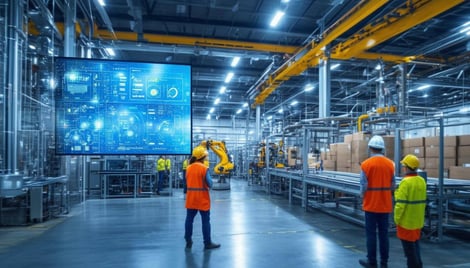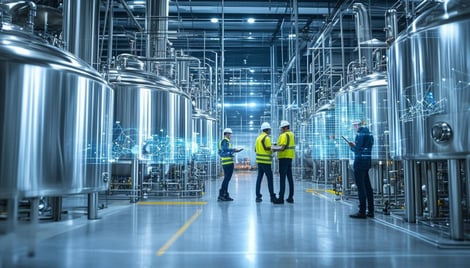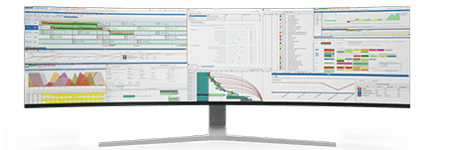
Harnessing IoT for Supply Chain Optimization in Chemical Manufacturing
In chemical manufacturing, supply chain management is an intricate puzzle. From the procurement of raw materials to the delivery of finished goods, the industry must juggle complex variables such as regulatory compliance, volatile market demands, and the inherent risks of handling hazardous materials. Enter the Internet of Things (IoT), a transformative technology that, when integrated with advanced planning and scheduling software like PlanetTogether and ERP systems such as SAP, Oracle, Microsoft, Kinaxis, or Aveva, can revolutionize supply chain operations.

The Promise of IoT in Chemical Manufacturing Supply Chains
IoT connects physical devices, machinery, and sensors to a digital network, enabling real-time data exchange and insights. This connectivity offers supply chain managers in chemical manufacturing several game-changing benefits:
Enhanced Visibility: IoT sensors can track raw materials, work-in-progress, and finished goods at every supply chain stage. This visibility ensures that critical data—such as location, temperature, and humidity—is accessible in real time. Such granular monitoring is particularly vital for sensitive chemicals requiring stringent environmental controls.
Predictive Maintenance: Equipment failures can disrupt production schedules and delay shipments. IoT-enabled machinery can predict maintenance needs based on usage patterns and sensor data, reducing downtime and improving overall equipment effectiveness (OEE).
Optimized Inventory Management: IoT systems can monitor inventory levels dynamically and communicate replenishment needs. When combined with advanced scheduling tools like PlanetTogether, supply chain managers can maintain optimal inventory levels, balancing costs and production requirements.
Risk Mitigation: IoT devices can detect potential hazards, such as chemical leaks or temperature deviations, and trigger immediate alerts. This proactive risk management protects workers and ensures regulatory compliance.


Integrating IoT with PlanetTogether and ERP Systems
To fully capitalize on IoT's potential, integration with advanced planning and enterprise resource planning (ERP) systems is essential. Here's how a coordinated approach involving PlanetTogether and ERP systems like SAP, Oracle, Microsoft, Kinaxis, or Aveva enhances IoT-driven supply chain management:
Data Consolidation and Analysis: IoT generates massive amounts of data. PlanetTogether's integration with ERP platforms enables seamless consolidation and analysis of this data, providing actionable insights for better decision-making. For instance, real-time production data from IoT sensors can inform PlanetTogether’s scheduling algorithms, optimizing production runs to meet delivery deadlines.
Enhanced Collaboration: Integration ensures that stakeholders across the supply chain have access to synchronized data. A chemical manufacturing facility using PlanetTogether alongside SAP can align production schedules with procurement timelines, ensuring that raw materials are available precisely when needed.
Proactive Demand Planning: IoT data on market trends, combined with ERP demand forecasting tools, allows supply chain managers to anticipate demand fluctuations. PlanetTogether’s dynamic scheduling can then adjust production plans to match forecasted needs, minimizing waste and maximizing throughput.
Improved Traceability: Regulatory compliance in chemical manufacturing often requires detailed traceability. IoT-enabled tracking, integrated with ERP systems and PlanetTogether, provides an end-to-end view of material and product flows, simplifying compliance reporting and audits.
Challenges and Solutions
While the integration of IoT with PlanetTogether and ERP systems offers significant advantages, it also presents challenges:
Data Overload: IoT generates vast amounts of data, which can overwhelm traditional systems. Implementing advanced analytics and machine learning within ERP and planning platforms addresses this issue by extracting actionable insights from raw data.
Cybersecurity Risks: Connected devices increase the risk of cyberattacks. Manufacturers must invest in robust security measures, such as encrypted communications and regular system audits, to safeguard sensitive information.
Integration Complexity: Combining IoT, PlanetTogether, and ERP systems requires significant effort and expertise. Partnering with experienced implementation teams ensures smooth integration and long-term success.
For supply chain managers in chemical manufacturing, IoT represents a powerful tool for addressing industry challenges and driving efficiency. When integrated with advanced systems like PlanetTogether and ERP platforms such as SAP, Oracle, Microsoft, Kinaxis, or Aveva, IoT enables a connected, intelligent supply chain capable of meeting today’s demands and tomorrow’s uncertainties.
Embracing IoT-driven strategies will not only enhance operational performance but also position companies as leaders in innovation and sustainability. Are you ready to take your manufacturing operations to the next level? Contact us today to learn more about how PlanetTogether and integrated scheduling solutions can help you achieve your sustainability goals and drive success in the chemical industry.























LEAVE A COMMENT